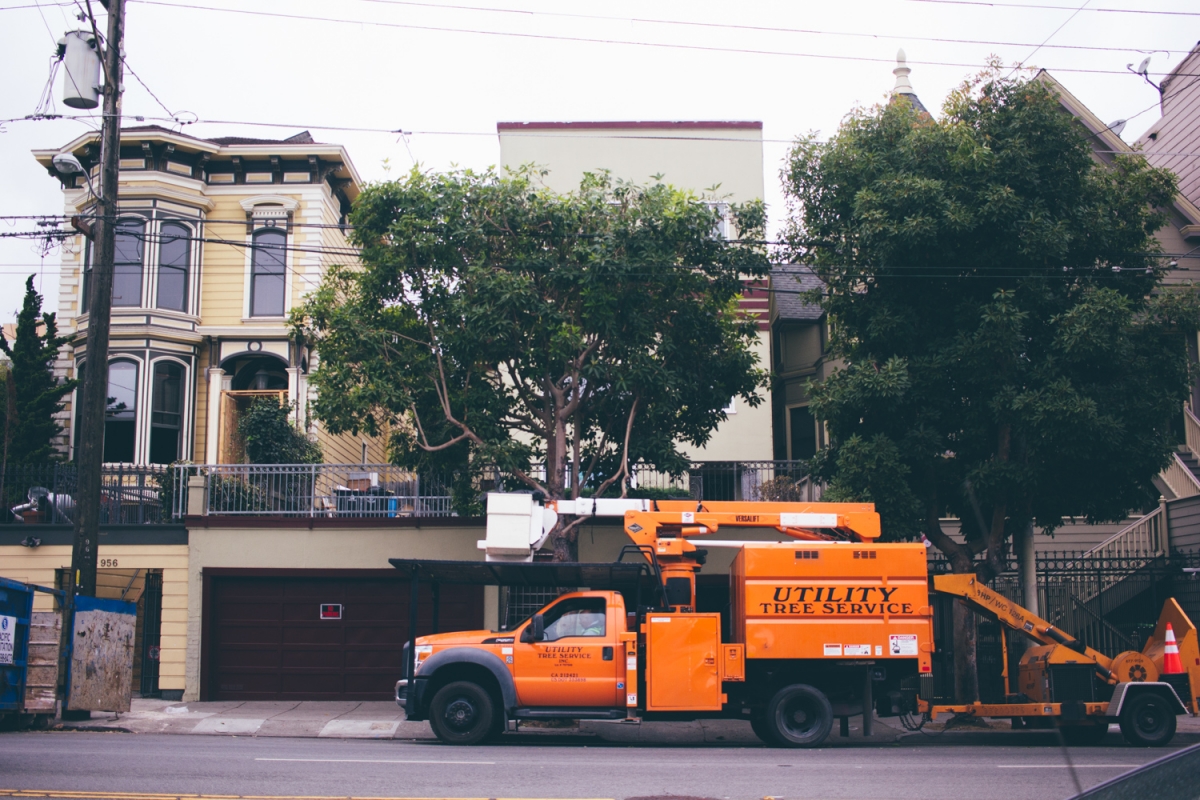
This Charter amendment would make it City Hall’s responsibility, once again, to maintain trees and surrounding sidewalks, the care obligation of which had recently transferred to private-property owners.
The Board of Supervisors voted 11-0 to put this initiative on the ballot.
Why is this on the ballot?
In 2005, then-Mayor Gavin Newsom’s Trees for Tomorrow campaign brought 25,000 new trees to San Francisco’s streets and sidewalks. That helped the city’s total number of trees reach its present-day count, topping 100,000.
 |
| A tree-trimming company maintains a tree situated among utility lines. Photo by Nadia Mishkin / San Francisco Public Press |
But those trees cost a lot of green to maintain. When the city faced a major budget deficit in 2011, Newsom’s successor, Ed Lee, decided to save money by shifting that burden from the city to the owners of the private properties abutting the trees.
The shift began in 2012 and is still going. To date, the care responsibility for more than 7,000 trees has been transferred to private owners, and the obligation on more than 10,000 will follow suit. When the transfer finishes, only about 12 percent of city trees will be under government management.
Tree maintenance can be complicated and expensive. It can cost as much as $1,000 to trim a single tree, and that does not include the cost to replace sidewalk damaged by the tree’s roots. And neglecting a tree can incur various fines, which can stack up quickly, and possibly jail.
Hundreds of property owners have opted to remove their trees. The city gave out 270 tree removal permits in fiscal year 2008-2009; that number increased to 515 in fiscal year 2014-2015, the San Francisco Examiner reported.
What would it do and at what cost?
The city would reassume responsibility for maintaining and removing trees adjacent to private property, as well as repairing any tree-related damage to sidewalks.
The city would pay for “routine” and “major” maintenance of trees with a new Street Tree Maintenance Fund. Beginning July 1, the start of the 2017-2018 fiscal year, the city would commit $19 million from the general fund, but that would fluctuate in subsequent years with the city’s level of discretionary revenue; when discretionary revenue increased or decreased, so would this fund.
The mayor could suspend the increases if the city faced a general fund deficit of $200 million or more.
Up to $500,000 of the fund’s money would go to the San Francisco Unified School District to cover the cost of caring for trees on school property.
Routine maintenance includes:
- adequate watering “to ensure the Tree’s growth and sustainability”;
- weed control;
- trash removal around a tree;
- staking;
- fertilizing;
- tree guards, grates and bracing;
- sidewalk repairs related to the tree’s growth or root system.
Major maintenance includes:
- structural pruning “as necessary to maintain public safety and to sustain the health, safety, and natural growth habit of the Tree”;
- pest and disease-management procedures “as needed and in a manner consistent with public health and ecological diversity”;
- replacement of dead or damaged trees.
The fund could not be used to pay for planting new trees where there are none. But Supervisor Scott Wiener, one of the official proponents, has told the Public Press that the fund was designed to be big enough to cover the costs of maintaining 50,000 new trees. “It’s easy to get private funds to plant trees,” he said.
The city has already budgeted $5.5 million in fiscal year 2017-2018 for maintaining and removing trees and repairing related sidewalk damage; the additional $13.5 million would come from the general fund, according to the city controller.
Property owners would also be relieved of personal liability for tree-related trip-and-fall injuries on public sidewalks, and for injuries or property damage from trees or limbs that fall.
City Controller Ben Rosenfield states that Proposition E “would significantly increase the cost of government.”
Is there a catch?
This ballot measure contains a section stating that, even if the voters pass it in November, Mayor Ed Lee will be able to prevent it from becoming law if, by the last day of the year, he decides that the city’s budget cannot spare this money.
In addition, the controller said: “This proposed amendment is not in compliance with a non-binding, voter-adopted city policy regarding set-asides. The policy seeks to limit set-asides which reduce General Fund dollars that could otherwise be allocated by the Mayor and the Board of Supervisors in the annual budget process.”
Who officially proposed it?
Supervisors Scott Wiener, John Avalos and Eric Mar.
Who officially opposes it?
No opposition argument was submitted to the Department of Elections.
Vote threshold to pass
Simple majority — 50 percent plus one.
Effective date if passed
July 1, 2017.
Follow the money
Two committees are spending money in support of Proposition E: “Yes on E, Coalition for Healthy Trees and Safe Sidewalks, with Major Funding by Friends of the Urban Forest Committee and Mitzi Johnson,” and “Friends of the Urban Forest (nonprofit 501(c) (3)), Yes on E.”
Follow the money at the San Francisco Ethics Commission: all Proposition E filings.
Endorsements: our methodology
The Public Press chose to count endorsements from organizations that backed multiple candidates or ballot measures, and that made those endorsements available online. We did not count endorsements from individuals.
If you think we missed an important organization, please tell us. We’d love to hear from you.
Tracked endorsements by organization
Written by: Noah Arroyo
Published: Sept. 30, 2016






